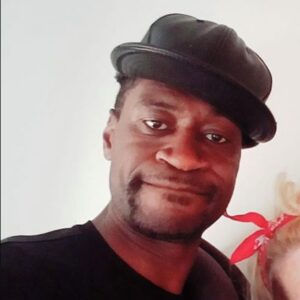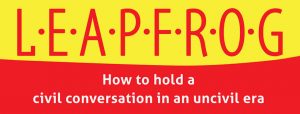This is George Floyd’s face.

Most of us know of him from the viral video of his death under the knee of Derek Chauvin, a white Minneapolis policeman. Or from the news media coverage this past week. Or from social media posts.
We deplore the killing. Of course we do. We know it should never have happened. And we know it was not new. White on black murder has been happening across our country for years, decades, centuries: since the first African slaves arrived on our shores in 1619. To learn more of this aspect of our history, click here.
Killing of Black Americans in broad daylight has never ended. We whites lived our separate lives, often unaware. If it didn’t impact us directly, how would we know? And then the videos began to go viral and our world became smaller.
The four musings that I’d planned for this month came to an end. One cannot muse about racism. But I am not writing today about racism, institutional or individual. I’ve written about it, starting with my series on how do we talk about race? Here are the links to Part I, Part II, and Part III. If you put RACISM into the search bar on the right, you’ll find a few more posts on the topic. I imagine in the months to come, I’ll write more.
This week I’ve been thinking of the human tendency — perhaps need? — to create an out group, an “other,” a scapegoat.
Whether it is people with different skin, religion, language, or traditions, how common it is to have a “them” that we fear. A “them” that shows “us” we’re superior. These are the stories that too often fill our history books.
We have a very human need to know where we belong, to know THAT we belong. I think that’s not a difficult idea to grasp. Who is our tribe? What does it mean to be me? What does it mean to be part of an “us?” But for too many, in order for there to be an “us,” there must be a “them.” And once we have that “them,” it becomes easier to put human life and value in a hierarchy of importance. And “they” suffer accordingly.
If by some miracle people woke to the realization that race is no more than a social construct and black or brown skin does not predict anything you need fear, there will always be the next “them,” the next outcast, the next scapegoat. I wonder what it could be that would put an end to this eternal battle?
I’ve also been looking at the assumptions I make about people, the judgments I hold, the expectations I carry from a single observation.
What do I think of people who drive Harleys and rev their engines at every opportunity (not kindly, I assure you)? What do I think of those who expressed what I saw as an unfounded hatred of Hillary Clinton? (I was aghast) What do I think when those with red MAGA hats march?
Most recently, I jumped to a very clear conclusion when I saw people without masks at my local grocery store. I do it more often than I realize, and more quickly than I’m currently comfortable with. I observe; then I judge. We all do it. And I’m bothered that I judge not simply what I see, but what I conclude is the essence of the person. He is selfish, or ignorant, or a jerk.
And, when I saw the photo and read the story of the white women who formed a barricade between Black protestors and police in Louisville this past week, I felt proud, hopeful. And still I judged. This time, these people whom I did not know but for this single action, were good people, obviously intelligent, caring, kind. Judgments come in many varieties.

We make judgments all the time. Of course we do. How else could we vote?
We make assumptions about people we do not know and those we do. We evaluate what we see in positive terms, and negative. The question is, how often do we realize that’s what they are: judgments, interpretations, opinions, evaluations. And in every case, we could be wrong.
Why do we hold so tightly to our interpretations? From where does that fevered pitch arise? I’m thinking it’s fear.
When I ponder how we might balance our need to belong with the tendency to demonize as we judge that “other,” love comes through as the only possible answer.
I’d love to hear your thoughts.
[box] LEAPFROG, my tiny handbook for handling those tricky conversations we all stumble onto, is available in digital format and paperback and will soon be out as an audiobook.

I’m participating in Amazon Affiliates, so your purchase through my website will enable me to make a wee bit more and not increase your cost at all. The above link takes you to the LEAPFROG page on my website (not yet accessible directly) where you can learn more about the book. To skip that page and go directly to the book’s page on Amazon, click here. Thank you.[/box]
Tim Fearnside
Janet, I think you’re spot on when it comes to humans’ tribal tendencies, so easily manipulated and preyed upon by demagogues and tyrants, and the root of so much war, injustice, and human suffering. I, too, would love to know “why.” Like you, I’m not particularly religious, but your post brings to mind certain Christian scriptures I grew up with – judge not, love thy neighbor, etc. I’ve long believed that the very essence of the Gospels was not so much the manifestation of Old Testament prophecies through sacrifice, blood, and redemption, but rather Christ’s revolutionary mandate to abandon tribal thinking, and corresponding assertion that God did not favor certain tribes or people over others. God is love, and people should love. Two thousand years later, this message remains largely rejected, even by many who purport to believe it. Perhaps now is the time the world is ready to embrace this type of change. We can only hope (or, if so inclined, pray).
Janet Givens
Thanks Tim. Your church emphasized love; how nice for you. Mine emphasized sin. I associate learning about love, and the way I look at it nowadays, to a Marriage Encounter weekend I took decades ago. Love is a decision, they convinced me. It’s a path you choose. I love that. Perhaps I’ll write about that for next week.
Janet Givens recently posted…Examining American Scapegoating
Marian Beaman
The George Floyd tragedy has rocked our worlds, my world too! Although I kept the theme I had planned for today, I had to add a note. Pure and simple, racism is sin. Tim referred to scriptural truth and I add this one: 1 John 4:20-21 (MSG)
If anyone boasts, “I love God,” and goes right on hating his brother or sister, thinking nothing of it, he is a liar. If he won’t love the person he can see, how can he love the God he can’t see? The command we have from Christ is blunt: Loving God includes loving people. You’ve got to love both.
And another: “Perfect love casts out fear,” my aspiration.
Marian Beaman recently posted…Comment on Cherry Ames and Curious George, What Do They Have in Common? by Jill Weatherholt
Janet Givens
Thank you, Marian. I appreciate your voice.
Janet Givens recently posted…Examining American Scapegoating
Ally Bean
I watch as people become consumed with belonging to a group, any group, and I wonder how that happens. I’m a free spirit, a perennial outsider, who has little to no interest in being associated with groups. Yet this need for tribal affiliations and the need to hate on others seems to be hardwired in many [most?] people. Thus we end up where we are today. I observe less to judge than to remain safe from unhinged people who hide in their group affiliations.
Ally Bean recently posted…In Which A 3:00 A.M. Conversation About An Alleged Nightmare Turns Into A Nightmare
Janet Givens
That ability to choose who we hang with is an important one, I agree. I’ve missed your blogs, Ally; have you cut back a bit?
Janet Givens recently posted…Examining American Scapegoating
Pamela Wight
Great questions. Looking inside, I want to say I’m not judgmental, but I think we humans are wired to be. Perhaps because of the need to belong in “a group,” which makes us safe? I’d like to say I’m most judgmental about those who are kind to others, and those who are hateful. I dislike the hateful people. Is that wrong of me? Am I judging? I usually stop and tell myself that the haters come from their own insecure place where perhaps they were treated hatefully. The answer to all of this? Just treat each person with love. No matter what.
Janet Givens
Yes, doesn’t that automatic judging feel hardwired, sometimes? Hardwired, programmed, genetic DNA material, or a hijacked amygdala — all viable explanations as far as I’m concerned. Thanks for dropping in, Pam. I apologize for my tardiness in Replying — turns out I can no longer Reply from my phone. Must look into that.
Janet Givens recently posted…Examining American Scapegoating